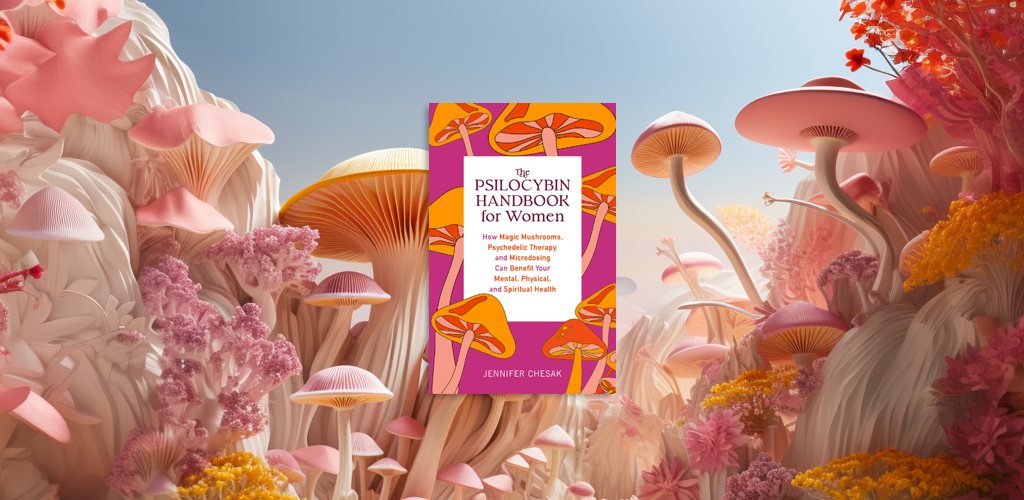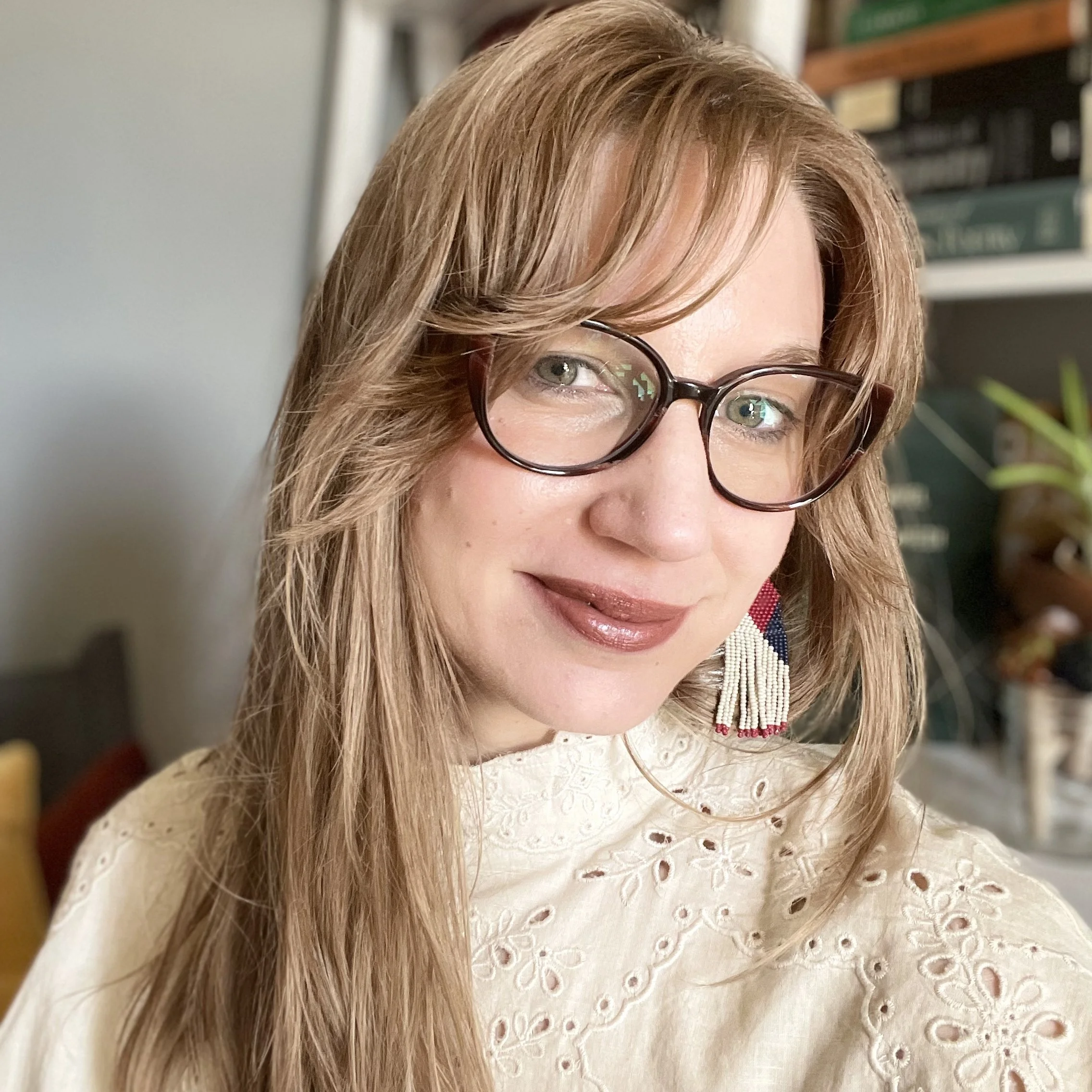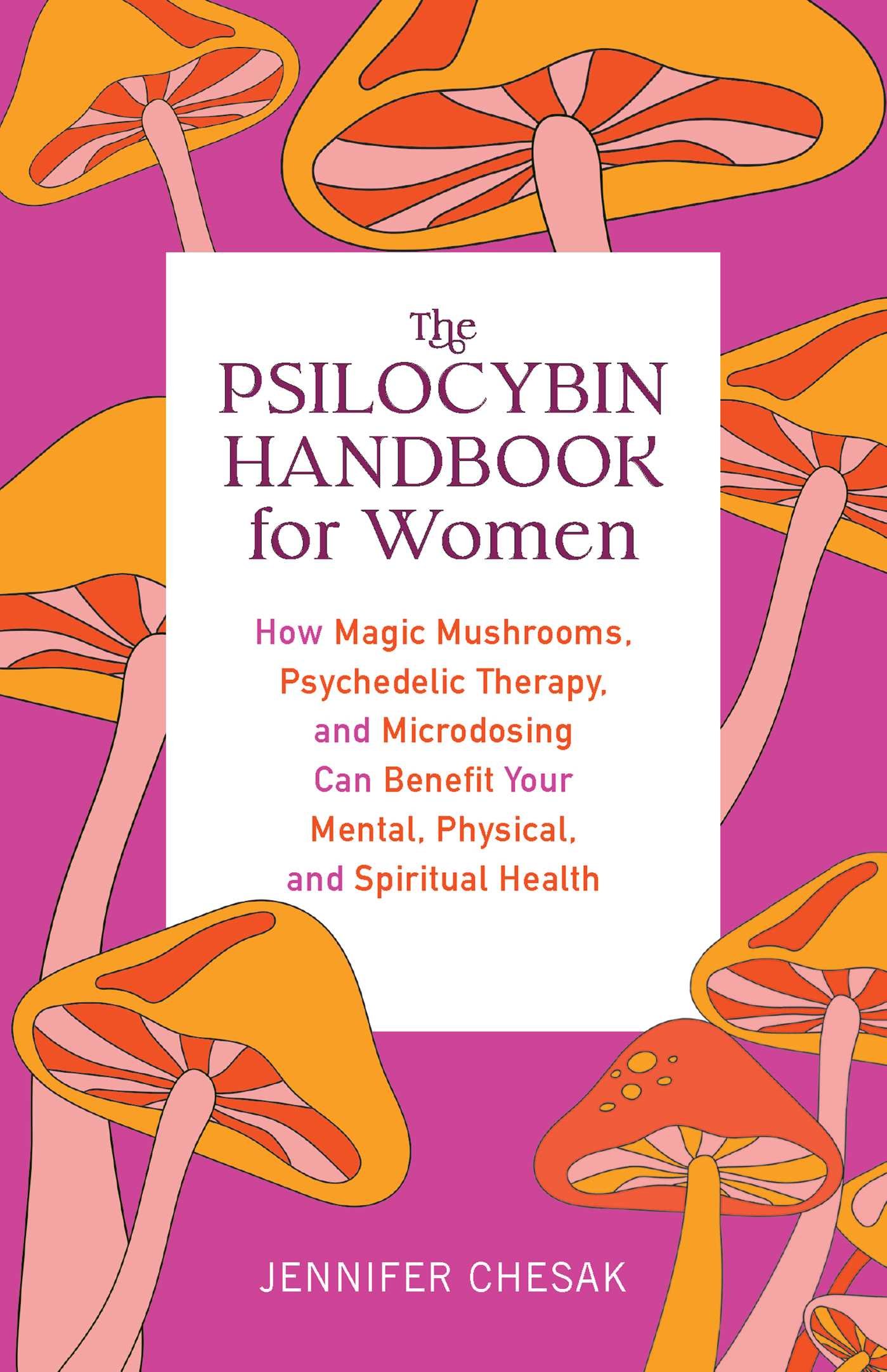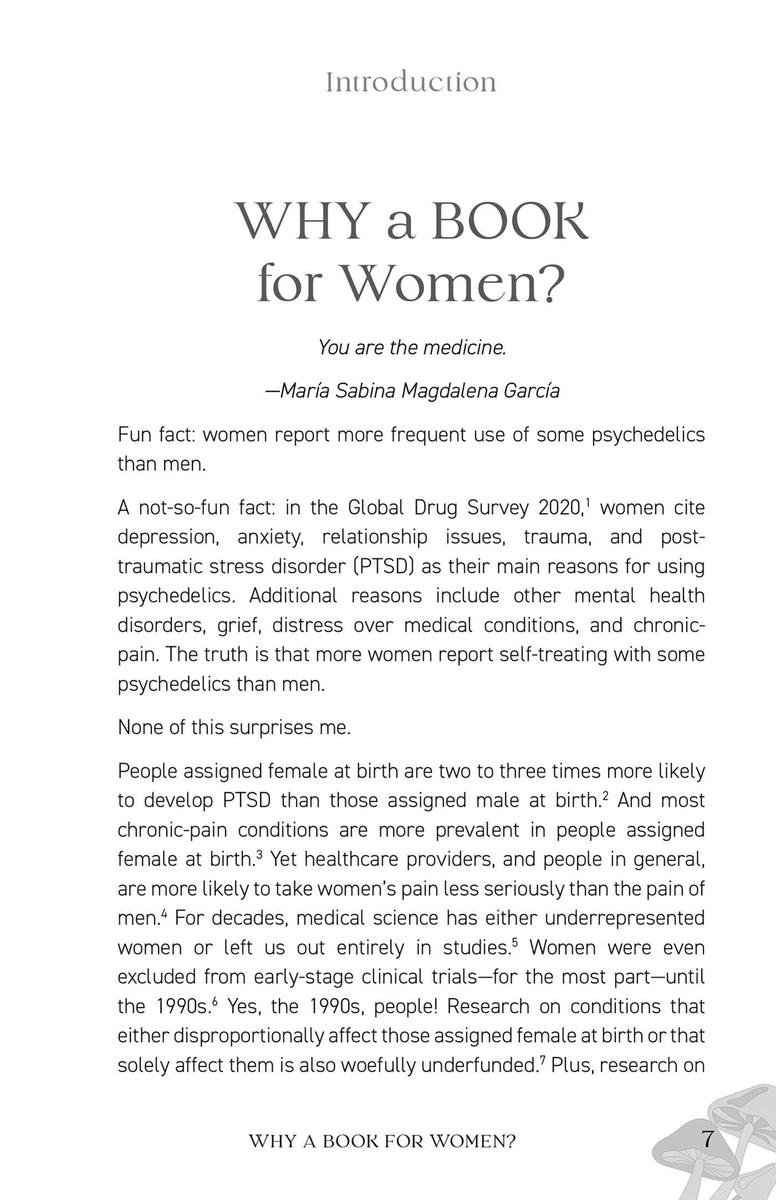An Interview with Jennifer Chesak, Author of “The Psilocybin Handbook for Women.”
In a world where wellness and personal growth have taken center stage, Jennifer Chesak stands out as a dedicated medical journalist, fact-checker, and editor who has made it her mission to explore uncharted territories of healing and empowerment. With her recent book, “The Psilocybin Handbook for Women,” she sheds light on the transformative potential of psychedelics, particularly psilocybin, for women seeking personal growth, healing, and empowerment.
By Alexandra Plesner
From an early age, Chesak's passion for journalism and a deep-seated interest in medicine, health, and wellness set the foundation for her career. But during the challenging times of the pandemic, she discovered a newfound fascination with psychedelics. As she delved into the latest research and explored the rich history and sacred use of psychedelics, Chesak's curiosity only grew stronger.
However, her psychedelic journey began when she summoned the courage to try psilocybin, the active compound found in "magic mushrooms." What followed was a profound and life-changing experience that propelled Jennifer Chesak into a world of self-discovery and healing.
Through her transformation, she recognized the immense potential of psychedelics in helping individuals overcome personal hurdles and for catalyzing inner growth.
In this exclusive interview, we had the opportunity to sit down with Chesak to delve deeper into her personal journey, the inspiration behind her book, and her vision for harnessing the power of psychedelics to empower women in their pursuit of wellness, healing, and self-discovery. Through her unique perspective and extensive research, Chesak sheds light on the untapped potential of psychedelics as a tool for personal transformation and explores the importance of providing tailored guidance for women navigating these experiences.
Join us for an enlightening conversation with Chesak, a remarkable journalist who fearlessly ventures into unexplored territories of knowledge, compassionately translating her findings into accessible and actionable content for the benefit of women worldwide.
Chesak's book explores several aspects and considerations related to psilocybin mushrooms for women. It delves into how psilocybin may impact the menstrual cycle, offering insights into the optimal timing for deeper psychedelic journeys and microdosing for supporting the menstrual cycle. Additionally, it addresses the intersection of parenting and psilocybin—including pregnancy and breastfeeding—female sexual health, and the importance of consent in guided psychedelic experiences.
What inspired you to write a book addressing the benefits of psilocybin mushrooms for women's mental, physical, and spiritual well-being?
According to recent survey-based research, women report more frequent use of some psychedelics than men, and a key difference is that more women are using psychedelics to self-treat various conditions, while men (not all) are using psychedelics in more of a recreational context. Why? People assigned female at birth are often left behind in the mainstream medical system. For example, women were primarily excluded from early-stage clinical trials until the 1990s, which has had startling ramifications. The Food and Drug Administration approved Viagra, a drug for male sexual dysfunction, in 1998. At that time we didn’t even have a complete picture of the clitoris. That came in 2005. Guess when women finally got a drug approved for female sexual dysfunction—not until 2015. Women are also more likely than men to get gaslit at the doctor’s office because of gender bias. I back up all these facts in my book with cited research.
Ultimately, women are turning to psychedelics for relief of mental and physical health issues because they often aren’t getting adequate care elsewhere. Plenty of books out there already explore psychedelics in general. But until now, no book has explored the intersection of women’s health with psilocybin. I wanted to write a book that fully explores this intersection so that people assigned female at birth have accurate and informative content regarding safety, logistics, and more.
“In ‘The Psilocybin Handbook for Women,’ I explore how psilocybin may affect the menstrual cycle, when in one’s cycle to do a deeper trip journey as well as cycle contexts for microdosing, the intersection of parenting and psilocybin (including the topics of pregnancy and breast/chestfeeding), female sexual health and psilocybin, and the importance of conversations surrounding consent when working with guides or therapists.”
One compelling aspect of the book is a research chapter that investigates the effects of psilocybin on conditions that predominantly affect women or impact them differently. Chesak, referring to it as “monster chapter 11,” investigates the research to date on psilocybin regarding conditions that solely affect people assigned female at birth, disproportionately affect them, or affect them differently.
“In addition to including new research, I lean on the experts to provide Indigenous wisdom, which is incredibly important regarding psychedelics. I also include my own story and the stories of several other women about how and why they use psilocybin and what effect it has had on their health and overall lives.”
What is it like?
Chesak opens the book with the question: What is it like? Sharing her personal experiences and the stories of other women, the author aims to foster a more open and informed dialogue about psychedelics. By dispelling misconceptions and reducing stigma, she hopes to make psilocybin feel more accessible to those curious or new to this field. The book emphasizes the profound meaning and transformative potential many individuals have reported from their psilocybin experiences.
“I believe that sharing my own journey with psilocybin, and the stories of other women, helps people who are perhaps new to or curious about psychedelics to become more comfortable with the topic. Movies, TV shows, and other fictional portrayals of psychedelics often show people having bad or ridiculous experiences or using psychedelics for purely recreational purposes. And while bad trips do happen, people often still report their experiences to be profoundly meaningful.
By writing about my own experience in an open and honest way, I hope to help cut through some of the misinformation and stigma out there and make psilocybin feel more accessible. Leading up to my first psilocybin journey, I had done tons of research, but I still had loads of questions on what my own trip would be like. The truth is that you won’t know until you do it.”
Psilocybin therapy for women's health
The book offers promising insights. For instance, case studies and anecdotal evidence suggest that psilocybin may help regulate irregular menstrual cycles. It may also help with conditions such as premenstrual dysphoric disorder (PMDD), endometriosis, and menstrual migraines, although we need robust research on these topics. Ongoing clinical trials also explore its potential for treating eating disorders.
“I am incredibly grateful to researchers Natalie Gukasyan, MD, and Sasha Narayan, MD, at Johns Hopkins, for their case study research on how psychedelics may affect the menstrual cycle. Although we need more research, case studies and anecdotal reports indicate that psilocybin may help to regulate the menstrual cycle if it has become irregular. In the book, I share the potential mechanisms. I’m also excited about the clinical trials in the works regarding psilocybin’s potential to help with eating disorders.”
Psilocybin mushrooms hold tremendous potential for empowering women and facilitating self-discovery, personal growth, and healing. The author draws on the REBUS model to explain how psilocybin enhances brain flexibility, allowing individuals to challenge and change negative beliefs about themselves. By harnessing this potential, women can tap into their inner strength and develop a deeper understanding of their abilities and support systems.
“In normal states of consciousness, we can have a hard time changing negative beliefs about ourselves or otherwise, but on psilocybin, we have a much better chance of doing so.”
Parenting and Psilocybin
Dedicated to exploring the intersection of parenting and psilocybin, Chesak shares surprising findings in her book. Parents report that psilocybin experiences enhance their engagement with their children, allowing for deeper connections and joyful interactions. Furthermore, the book addresses the significance of healing traumas to break the cycle of generational trauma, which can profoundly impact families. Psilocybin therapy holds potential in this regard.
“I found experts who offer nuanced information on psilocybin's effects during pregnancy. While the safety of psilocybin for fetuses remains unclear, it's crucial to consider the well-being of both the pregnant person and the fetus. I share the story of a woman who used psilocybin to address her alcohol-related concerns, highlighting the need for thoughtful consideration.
When it comes to parenting in general, a few things came up. First, parents are finding that psilocybin is helping them engage with their kids. For example, a parent might go off and do a psilocybin journey on their own. Then when they’re back in their normal state of consciousness, they find that they enjoy playing with their kids more—because, let’s be honest, sometimes playing games with a toddler isn’t always super fun.
Another thing I write about is that parents are working to heal or tackle their traumas as a way of ending the cycle of trauma that can perpetuate for generations. I see a lot of potential for psilocybin to help. Unrelated to psychedelics, I’ve researched at length adverse childhood experiences (or ACEs for short). ACEs are traumas that occurred in one’s childhood, like living through a natural disaster, enduring abuse, or even experiencing parental divorce or severe childhood illness. These things alter our stress response. Research shows that one in six adults has experienced four or more ACEs. And children of parents with four or more ACEs have a threefold risk of experiencing four or more ACEs, as well. ACEs can seriously affect a person’s physical and mental health. We can’t do anything about the past, but we can work on our ACEs to benefit ourselves and the next generation.”
Addressing Challenges
Addressing gender-specific challenges is a vital aspect of the book. The author highlights the importance of consent in psychedelic therapy, particularly in light of allegations of sexual assault that have emerged in the psychedelics space. By raising awareness and providing guidance on navigating consent and finding reputable practitioners, the book aims to ensure safe and ethical practices.
“Sexual assault is perpetrated across all genders, and certainly, sexual assault is underreported in people assigned male at birth. However, we know that people assigned female at birth are disproportionately affected. Unfortunately, in the psychedelics space, allegations of sexual assault have surfaced. I recommend the well-reported podcast called “Cover Story: Power Trip” for anyone interested in learning more about this topic.
In my book, I wanted to provide context regarding consent for touch in psilocybin sessions when working with guides or therapists or being around others at retreats. Participants can completely take touch off the table if they prefer. Psychedelics can make us feel quite vulnerable, and we’re also more susceptible to powers of persuasion while in such an altered state of consciousness.
Psychedelics are showing promise to help with trauma. So it’s unfortunate that the space has become a place where trauma might also be perpetrated.”
Taking first steps
For women considering psilocybin therapy or microdosing, Chesak advises thorough research, including exploring potential therapists or guides. She encourages individuals to be open to the teachings of psilocybin and to journal their experiences for long-term insights. Engaging with like-minded individuals and participating in integration sessions can further enhance the process of learning from these experiences and effecting positive life changes.
“Read or learn as much as you can about psilocybin before undergoing your deeper therapeutic journey or starting a microdosing protocol. Research your potential therapist or guide extensively to see if they have any negative reviews or allegations against them. Be open to whatever the mushroom is trying to teach you. What it’s teaching you is likely what you need to know most.
That may sound woo. But think of it as if the substance is essentially engaging with what’s already somewhere in your mind—fears, memories, traumas, joys, etc.—to show you your own power, abilities, potential, and inner tools, as well as the power of your support system. Journal about your experience immediately afterward and long term. You’ll continue to gain insights. Engage with like-minded individuals to share your experience. These practices all facilitate integration, learning from your experience and effecting positive life changes where needed.”
Integrating psychedelic experiences explicitly tailored to women's needs requires recognising the disproportionate impact of trauma, depression, anxiety, PTSD, and chronic pain conditions on women. Integration communities and circles are crucial in validating women's lived experiences and facilitating healing. Chesak also emphasizes the importance of listening, understanding, and effecting community change to foster gender equality and avoid perpetuating biases.
“I don’t necessarily think women need all-women integration circles (though that could be of benefit). I do see healing potential when men are involved if they truly listen and hear women and then effect change in their communities rather than leaving it up to women to do the work of fostering gender equality. Men also need to be hyper-aware to avoid mansplaining psychedelics or their own perceptions of the lived experiences of women to women.”
Setting intentions before a psilocybin journey is valuable; however, Chesak cautions against becoming too fixated on specific intentions. Instead, she suggests embracing open-mindedness and receptivity to whatever arises during the journey, allowing it to guide personal growth and exploration.
In conclusion
In general, the book features inspiring stories and case studies that exemplify the transformative potential of psilocybin therapy for women's mental health. Through firsthand accounts, readers can witness how psilocybin has aided healing from eating disorders, anxiety, trauma related to ADHD, and other mental health challenges.
As the stigma surrounding psychedelics diminishes, the author envisions a future where psilocybin therapy for women becomes integrated into mainstream healthcare. She hopes for the de-scheduling and decriminalization of psychedelics and increased awareness and understanding among medical professionals.
“Right now, although people are certainly adding to the conversation about psychedelics, we still have a long way to go to reduce stigma before we can feel fully comfortable in telling our doctors we’re either interested in or already using psychedelics.”
By fostering open conversations and encouraging individuals to communicate openly with their doctors about psychedelic use, Chesak seeks to create a more accepting and informed healthcare environment.
“‘The Psilocybin Handbook for Women’ provides examples and contexts for understanding the existing problems in the medical system regarding women’s health and their lived experiences, as well as why and how we’re turning to psychedelics. The book also shows the ways in which psilocybin may be able to help. And I hope the book helps cut through some of the misinformation and stigma that still infiltrates our society regarding psychedelic use.”

